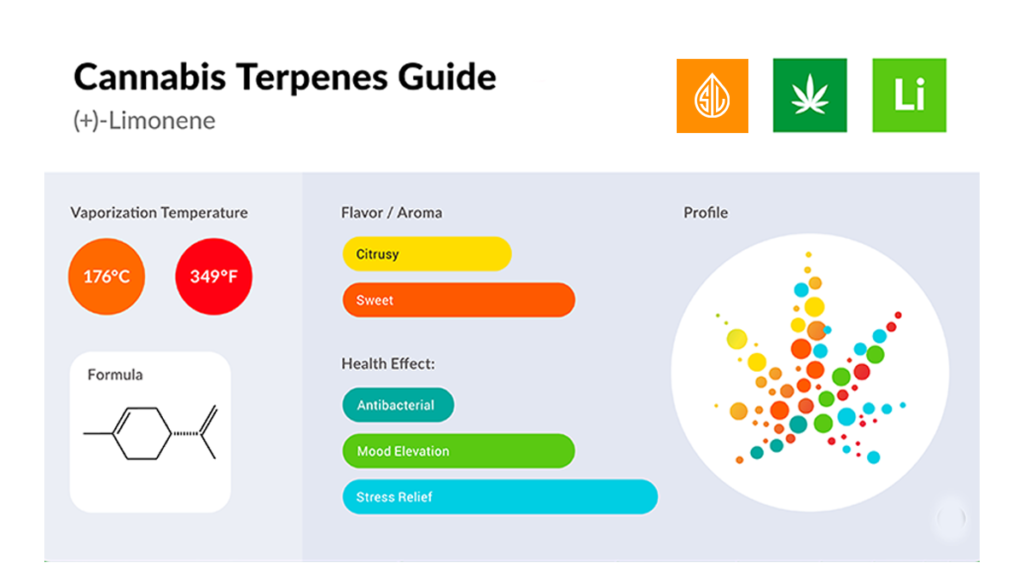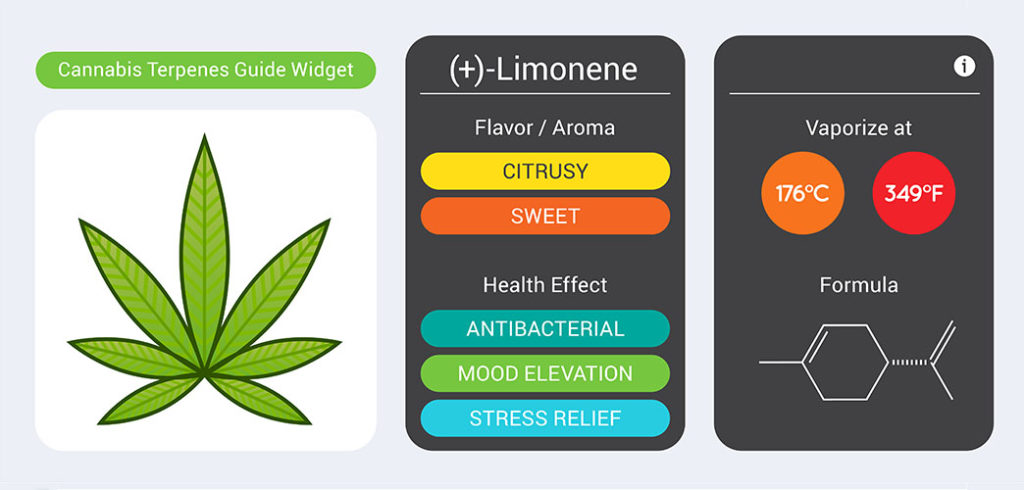
Limonene: Uses and Benefits

Sara S.
Simple Leaf Staff
Table of Contents
The Lively World of Limonene Terpene: Exploring its Uses and Benefits
When you peel an orange and are greeted with that fresh, zesty aroma, you’re experiencing the magic of Limonene. Limonene is a naturally occurring terpene compound found in the essential oils of citrus fruits such as oranges, lemons, and grapefruits. It is highly valued for its pleasant aroma and is widely used in the fragrance and food industries.
In addition to its aromatic properties, limonene boasts several other benefits. It has been shown to have antimicrobial properties, making it effective against certain bacteria and fungi. Limonene also exhibits potential anti-inflammatory effects and has been studied for its potential use in treating various inflammatory conditions.
This terpene, known for its strong citrus scent, is found in a variety of fruits and plants, including lemons, oranges, and even some strains of cannabis. In this article, we’ll explore the uses, benefits, and effects of Limonene.
Understanding Limonene
Limonene, specifically D-Limonene, is a monoterpene that’s known for its potent citrus aroma. It’s one of the most common terpenes found in nature, particularly in citrus fruits. But Limonene isn’t just a pleasant scent; it also has a variety of potential uses and benefits that make it a terpene of interest in various industries.
Uses of Limonene
Limonene is used in a wide range of applications. It’s a common ingredient in essential oils, where it contributes to their citrusy, uplifting scent. These essential oils are often used in aromatherapy to promote a positive mood and reduce stress.
In addition to its use in aromatherapy, Limonene is also used in the food and beverage industry as a flavoring agent due to its citrusy taste. It’s also used in cleaning products for its fresh scent and potential antimicrobial properties.
Limonene Terpene Benefits
Limonene is a naturally occurring terpene found in a variety of plants, particularly in the rinds of citrus fruits like lemons, oranges, and grapefruits. It is commonly used for its aromatic qualities in perfumes, cleaning products, and as a flavoring agent in foods. Beyond its olfactory and gustatory appeal, limonene terpene benefits have been studied for their potential health benefits.
Potential Health Benefits of Limonene
Research into the potential health benefits of Limonene is ongoing, but early studies suggest it may have several therapeutic properties. Here are some of the limonene terpene benefits that have been researched. Below are some of the potential benefits of limonene, along with references to scientific studies or reviews that support these claims. Please note that while some of these studies are promising, more human research is needed to fully confirm the limonene terpene benefits human health..
Antioxidant Properties
- Study: “Antioxidant activity of citrus limon essential oil in mouse hippocampus” published in Phytotherapy Research.
- Findings: Limonene has been shown to have antioxidant properties that can help combat free radicals in the body.
- Source: PubMed
Anti-Inflammatory Effects
- Study: “Anti-inflammatory effects of limonene from yuzu (Citrus junos Tanaka) essential oil on eosinophils” published in Journal of Food Science.
- Findings: Limonene has anti-inflammatory properties, potentially useful for conditions like arthritis.
- Source: PubMed
Antimicrobial Activity
- Study: “Antimicrobial activity of the essential oil from Lippia sidoides, carvacrol and thymol against oral pathogens” published in Brazilian Journal of Medical and Biological Research.
- Findings: Limonene has antimicrobial properties effective against certain bacteria and fungi.
- Source: PubMed
Anti-Cancer Potential
- Study: “Limonene: Aroma of innovation in health and disease” published in Chemico-Biological Interactions.
- Findings: Preliminary studies suggest limonene may have anti-cancer properties, particularly against breast and lung cancers.
- Source: PubMed
Digestive Health
- Study: “D-Limonene: safety and clinical applications” published in Alternative Medicine Review.
- Findings: Limonene may help in the treatment of gastrointestinal issues like acid reflux.
- Source: PubMed
Mood Enhancement
- Study: “Effects of Inhalation Aromatherapy on Symptoms of Sleep Disturbance in the Elderly with Dementia” published in Evidence-Based Complementary and Alternative Medicine.
- Findings: The aromatic properties of limonene are used in aromatherapy for mood enhancement.
- Source: PubMed
Skin Health
- Study: “Anti-inflammatory and skin barrier repair effects of topical application of some plant oils” published in International Journal of Molecular Sciences.
- Findings: Topical applications of limonene have been explored for treating skin conditions like acne and eczema.
- Source: PubMed
Respiratory Health
- Study: “Bronchodilator activity of d-limonene of Alphonso mango” published in Indian Journal of Physiology and Pharmacology.
- Findings: Inhaling limonene vapor has bronchodilatory effects, beneficial for people with asthma.
- Source: PubMed
Disclaimer: This information is not intended to be a substitute for professional medical advice, diagnosis, or treatment. Always seek the advice of your physician or another qualified health provider with any questions you may have regarding a medical condition.
Limonene Terpene in Cannabis
Interestingly, Limonene is also found in certain strains of cannabis. It’s believed to contribute to the ‘entourage effect,’ a theory that suggests the various compounds in cannabis work together to enhance the plant’s overall effects. Some cannabis users report that strains high in Limonene provide a mood-boosting effect. Here are some cannabis strains that are known to be high in limonene:
- Super Lemon Haze: This sativa-dominant hybrid is known for its strong lemony scent and taste, which is a direct result of its high limonene content.
- Durban Poison: This pure sativa strain from South Africa is known for its sweet smell and energetic, uplifting effects. It’s also high in limonene.
- OG Kush: This classic strain has a unique terpene profile that includes a good amount of limonene, contributing to its complex aroma that combines notes of fuel, skunk, and spice.
- Jack Herer: Named after the cannabis activist and author of The Emperor Wears No Clothes, this strain is known for its clear-headed, blissful effects and high limonene content.
- Sour Diesel: This invigorating sativa-dominant strain is named after its pungent, diesel-like aroma. It’s also high in limonene, which contributes to its memorable scent.
- Quantum Kush: This sativa-dominant strain is known for its high THC content and significant amounts of limonene, contributing to its complex aroma of earthy, sweet, and tangy notes.
- Strawberry Banana: This indica-dominant hybrid is known for its taste and aroma, which are similar to a sweet, fruity smoothie. It’s also high in limonene.
- White Fire OG (WiFi OG): This hybrid strain is known for its uplifting and cerebral effects. It has a strong citrusy aroma due to its high limonene content.
- Do-Si-Dos: This indica-dominant hybrid is known for its sweet, floral, and earthy aroma with hints of lime and mint, indicating a high limonene content.
- Tangie: This sativa-dominant strain is a remake of the popular version of Tangerine Dream that was sought-after in the 1990s. The genetics on this strain are a cross of California Orange and a Skunk hybrid, and its citrus heritage is most evident in its refreshing tangerine aroma which is rich with limonene.
That’s quite the list of Limonene strains to check out! Remember, the exact terpene profile can vary based on the growing conditions and curing process, so it’s always a good idea to ask your budtender for lab results to confirm the terpene profile of a specific batch.
Limonene Solubility
Limonene, being a nonpolar compound, is not soluble in water, which is a polar solvent. This is due to the principle “like dissolves like” which means that polar substances tend to dissolve in polar solvents, and nonpolar substances dissolve in nonpolar solvents.
However, limonene is soluble in many organic solvents, including:
- Ethanol
- Acetone
- Chloroform
- Carbon tetrachloride
- Diethyl ether
Limonene is also soluble in oils, given that the oils are nonpolar. This is why limonene is often found in essential oils extracted from plants. In terms of its solubility in other substances, it’s always best to refer to a chemical reference or database for specific solubility information.
Is D-Limonene Safe?
Limonene is considered a safe compound with low toxicity levels. It can be used as a flavoring agent in food products, as well as an ingredient in cosmetics, cleaning products, and fragrances.
Limonene is a colorless liquid hydrocarbon commonly found in the peels of citrus fruits such as lemons, oranges, and grapefruits. It has a distinctive citrus aroma and is widely used in various industries due to its versatile properties.
One of the key applications of limonene is as a solvent made from the skin of oranges. Its ability to dissolve oils and fats makes it an effective ingredient in cleaning products, degreasers, and solvents for industrial purposes. Additionally, limonene is utilized as a flavoring agent in food and beverages due to its pleasant smell and taste.
Furthermore, limonene has been studied for its potential health benefits. It has shown antioxidant properties, which may help protect against oxidative stress and inflammation. Some research suggests that limonene may also have anticancer effects by inhibiting tumor growth and promoting apoptosis.
Limonene is a valuable compound with numerous applications across different industries. Its solvent properties, pleasant aroma, and potential health benefits make it an intriguing ingredient worth exploring further.
Limonene Side Effects
While limonene, particularly the D-limonene form, is generally considered safe for use in food products and cosmetics, it can cause side effects in some individuals, especially when used in large amounts or for extended periods. Here are some potential side effects:
- Skin Irritation: Limonene, especially when oxidized, can cause skin irritation or allergic reactions in some people. This can result in redness, itching, or rash.
- Eye Irritation: If it comes into contact with the eyes, limonene can cause irritation.
- Gastrointestinal Problems: When taken orally in large amounts, limonene may cause nausea, vomiting, or diarrhea.
- Respiratory Issues: Inhalation of limonene vapors can potentially cause respiratory problems such as throat irritation, coughing, or shortness of breath.
- Allergic Reactions: Some people may have an allergic reaction to limonene, resulting in symptoms such as hives, difficulty breathing, or swelling of the face, lips, tongue, or throat.
- Drug Interactions: Limonene may interact with certain medications, altering their effectiveness. Always consult with a healthcare provider before starting any new supplement regimen.
Remember, everyone’s body reacts differently to different substances, so what causes a reaction in one person may not in another. If you’re considering using limonene for health purposes, it’s always a good idea to talk to a healthcare provider first. They can provide guidance based on your specific health situation and needs.
Limonene Terpenes
From its vibrant, citrusy aroma to its potential therapeutic benefits, Limonene is a fascinating terpene with a wide range of uses and applications. Whether you’re interested in aromatherapy, looking for natural ways to support your health, or curious about the world of cannabis, Limonene is a terpene worth knowing.
Remember, while Limonene has many potential benefits, it’s always important to use it responsibly and consult with a healthcare professional before starting any new health regimen.
Stay tuned for our next article, where we’ll explore another intriguing terpene that you need to know.
Meta Keywords: D-Limonene Solvent, Is D-Limonene Safe, Limonene Oil, Health Benefits of Limonene, Limonene Terpene Effects Chart, Limonene Solubility, Limonene Properties, d-limonene, Limonene strains, Limonene Properties, limonene terpene effects









